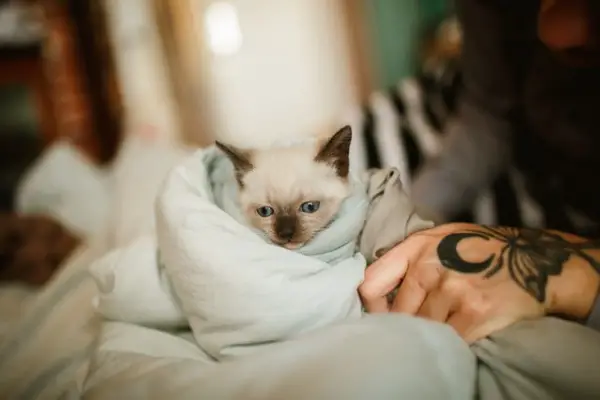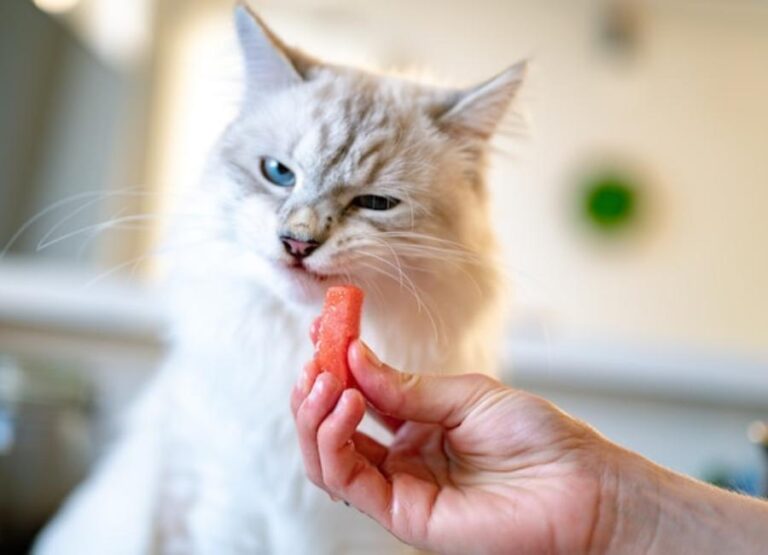6 Common Reasons Why Sphynx Cats Smell & Preventive Tips
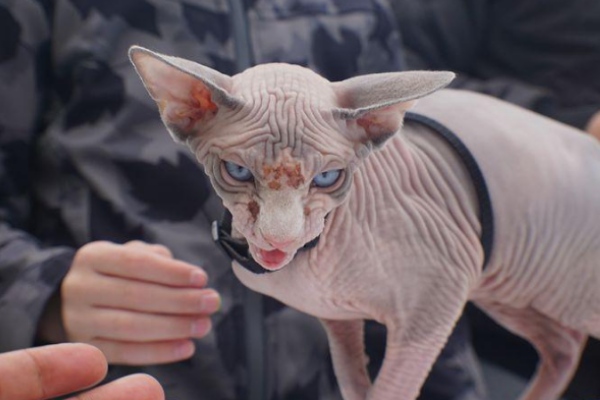
Just because most of them are hairless and have oily skin people ask do Sphynx cats smell, and that is exactly what this post is all about.
This post will be looking at some common reasons why Sphynx cats smell and ways to control or prevent them to smell.
Why Sphynx Cats Smell
Sphynx cats may smell for a variety of reasons including accumulation of natural oil on their skin, dental issues, reel end gland issues, ear infection, skin infections, and untreated wounds in a Sphynx cat skin.
Let’s break it down…
Here are some common reasons why Sphynx cats smell:
1. Accumulation of natural oil on their skin
They should be washed once a week with warm water and hypoallergenic shampoo to help wipe away a buildup of natural oils and prevent blackheads and pimples.
You may think that Sphynx cats are hairless therefore no need to brush or bathe them, but that is not true.
Sphynx cat skin produces natural oil that helps them stay warm and keep their skin healthy.
Well if this natural oil keeps accumulating without you cleaning them up properly, they trap microorganisms and dust that cause them to smell.
2. Skin infections
A Sphynx cat with untreated skin diseases can develop a foul odor all over its body.
Sphynx cats’ skin infections are frequently caused by other, underlying health issues such as wounds, allergies, parasites, and cancer.
As well as anything that interferes with the skin’s natural defense systems.
The Sphynx cat’s coat may thin and the skin may be clearly inflamed if the illness is severe.
After touching a cat with a serious skin illness, you may detect a greasy, foul layer on your hands.
Due to the presence of oil, the odor is usually produced by bacterial or fungal overgrowth.
3. Untreated wounds on the Sphynx cat skin
Skin wounds can develop infected if they are buried behind the hairless skin of your Sphynx cat.
This might result in a foul-smelling discharge (pus) seeping from the incision.
If your Sphynx cat has an abscess, which is commonly caused by a bite wound from another cat, and the abscess ruptures, you’ll likely notice a foul stench as the fluid drains.
These wounds attract bacterial infections with a rotten stench, although depending on the kind of organism involved, you may detect a pleasant odor.
If you can’t figure out why your cat’s body smells terrible, try brushing your fingers through the coat and checking for wounds.
If you detect even one wound, contact your veterinarian right away.
4. Sign of a developing ear infection
An overgrowth of yeast, bacteria, or ear mites in the ears causes ear infections, leading to your Sphynx cat smell.
Musty-smelling yeast infections can occur when a Sphynx cat has an allergy or another disease that changes the environment within the ear, allowing yeast to thrive.
You may notice that your Sphynx cat’s ears smell bad in addition to scratching and head shaking if there is a risk of developing an ear infection.
If you notice any bad smell with your Sphynx cat, examine the interior to see if there is any debris or pus since this might indicate an ear infection.
Make an appointment with your veterinarian as soon as possible to ascertain if an ear infection exists and to begin treatment.
5. Reel end gland issues
The reel end glands are small sacs found right outside the reel end of a Sphynx cat.
They contain an oily, rancid, and slightly fishy-smelling fluid, which is generally expelled with feces.
Sphynx cats may also leak the fluid when they are scared, stressed, or excited.
The reel end glands can become inflamed, infected, or impacted in some circumstances.
Some of the fluid in the reel end gland might leak out, leaving a cat with an unpleasant stench that won’t go away.
Most Sphynx cats scoot and massage their hindquarters or lick their reel end compulsively.
6. Growing dental issues
One of the most prevalent reason for foul breath in Sphynx cats is dental problems.
Because plaque and tartar include germs, Sphynx cats may have a terrible odor.
Gingivitis and gum disease can result from the accumulation, which can lead to tooth loss.
Bad breath in Sphynx cats is most of the time a typical indication of a health issue.
Something the Sphynx cat ate might produce temporary mouth smells.
In Sphynx cats and other cats as well mouth odor might also develop as a result of severe renal disease or uncontrolled diabetes.
How to get rid of bad smell in Sphynx cats
Since Sphynx cats can smell for a variety of reasons that are both obvious and mundane.
For example, after eating a can of highly stinking cat food or examining the rubbish outside.
Make an appointment with your veterinarian if you can’t simply identify the main source of your Sphynx cat’s odor.
The doctor will begin by taking a thorough medical history and performing a physical examination which will include a comprehensive inspection of your Sphynx cat:
- Mouth
- Skin
- Ears
- Hind end, etc.
After that, they should be able to tell you where the stench is originating from and what steps need to be taken to diagnose and cure it.
Here are some common ways to prevent Sphynx cats from smelling:
- Clean the area or the spot of Sphynx cat regularly.
- Clean all the Sphynx cat toys from time to time.
- Be sure to keep the windows open for ventilation.
- You can use room spray when necessary.
- Make sure you clean the litter box of the Sphynx cat on a regular basis.
- Don’t let your Sphynx cat go outside without supervision.
- Make sure your Sphynx cat is eating the right food.
- Bathe your Sphynx cat on a regular basis.
- Avoid parasite infestations by keeping your home clean.
- Schedule regular medical check-ups.
When to talk to the Vet
Remember that cats, including Sphynx, are masters at concealing sickness.
Things might be quite terrible by the time you discover any indications of disease.
Make an appointment with your veterinarian as soon as you notice any indications of disease or a strange odor that persists.
Are Sphynx Cats High Maintenance
Yes, Sphynx cats are high maintenance cats due to the presence of oily skin that can smell if not properly cared for, and they require high-quality cat food which can be expensive.
The fur of a cat would ordinarily draw the oil away from the skin, but the Sphnyx’s skin is oily and may retain it.
While a Sphynx cat’s overall greasiness may be controlled with food, they will periodically require baths to eliminate deposited oil and debris.
Sphynx cats don’t need to be combed, but they do need to be bathed frequently, at least once every two to three weeks.

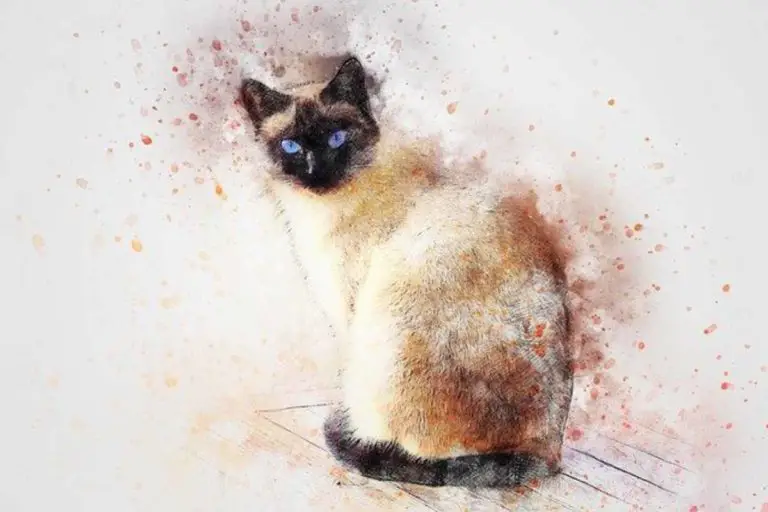

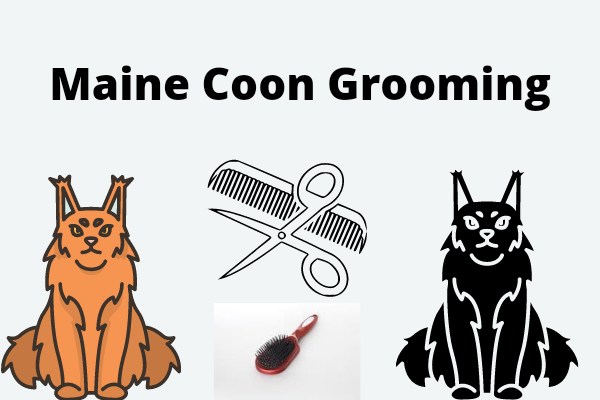
![Why Is My Kitten Drinking So Much Water [9 Reasons] Why Is My Kitten Drinking So Much Water](https://petcreeks.com/wp-content/uploads/2023/12/pexels-helena-jankovicova-kovacova-16440316.jpg)
